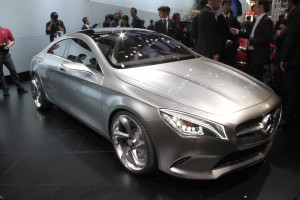After suffering a series of setbacks in the world’s largest automotive market last year, Daimler AG isn’t planning to let that happen again. It has already shaken up its management team and now the parent of Mercedes-Benz is taking a major stake in its Chinese partner.
Daimler will invest $875 million for a 12% share of BAIC Motor, a subsidiary of Beijing Automotive Industries Corp. BAIC produces Mercedes vehicles for the Chinese market. The investment appears to be a first step towards a planned initial public offering by BAIC Motor, according to Chinese auto industry observers.
“Our investment is a strong sign of the increased level of trust and cooperation between our two companies and clearly emphasizes the long-term commitment to a joint successful future,” said Dieter Zetsche, who serves as both CEO of Daimler AG and its Mercedes-Benz brand.
The deal still has to be approved by Chinese authorities but the two companies appear confident they’ll wrap things up by year-end or, at worst, early 2014.
Daimler’s relationship with BAIC actually came secondhand through its aborted marriage with Chrysler. The U.S. maker’s Jeep brand was the first foreign automaker to produce vehicles in modern China, a relationship that began soon after the U.S. and China ended decades of Cold War tensions. After DaimlerChrysler broke apart, the German side of the company retained the BAIC partnership. Chrysler has since established a new alliance of its own but lags a strong presence in the market.
Chinese auto sales have surged dramatically since the beginning of the new millennium, growing by nearly triple-digit figures some years. The market slowed down unexpectedly in 2012, demand rising by a relatively modest 7.1% — though at 15.5 million vehicles, it was still the world’s largest national automotive market, outselling the U.S. by 1 million units.
Daimler, however, gained just 4% in 2012, and the maker notably had to make a number of concessions to maintain even that pace, including sharp price cuts on a number of models, including the flagship S-Class.
That led to a major shake-up in Daimler’s Chinese operations last December, Hubertus Troska being named the new head of operations in that country. Significantly, Troska was also given a seat on Daimler Board of Management – a move that positions him above national managers in key markets such as the United States.
Meanwhile, China’s sovereign wealth fund is now considering a stake in Daimler AG, as TheDetroitBureau.com reported last month.
According to Zetsche, the expanded relationship with BAIC Motors will help both manufacturers improve their ability to “take advantage of opportunities” in China.
It also should help BAIC in “accelerating the development of (its) self-owned brand,” according to Chairman Xu Heyi, which it eventually hopes can rival foreign marques in the Chinese market – possibly including Mercedes.

